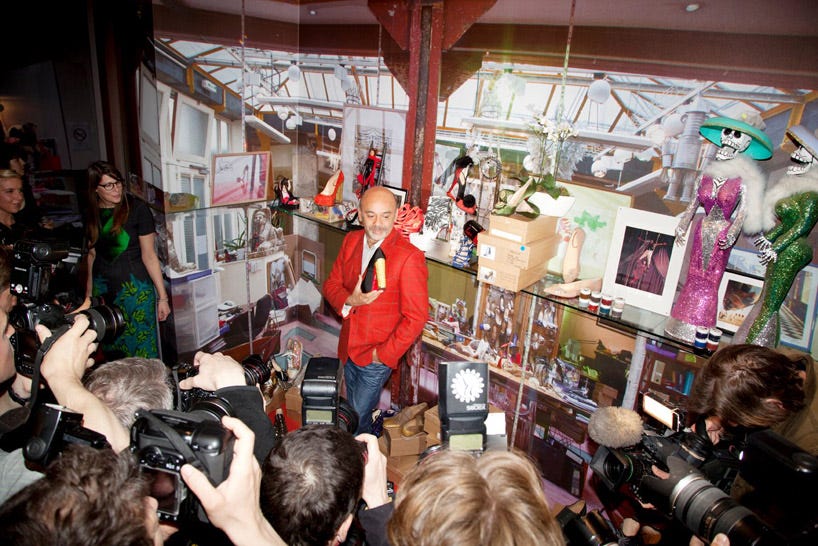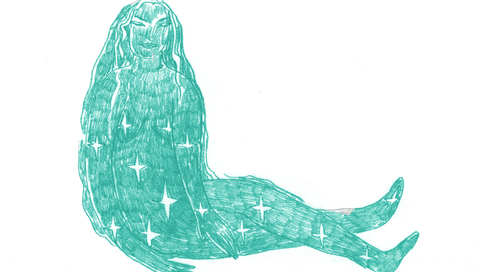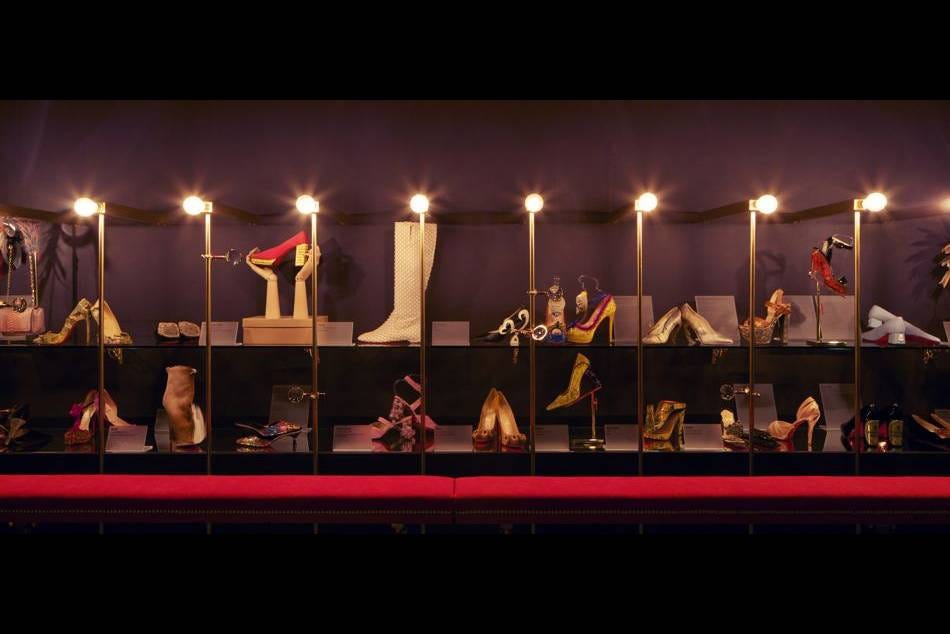MOVE OVER, GenAI ➡ FOLLOWING OUR GUT FEELING IS THE REAL SUPERPOWER
Why listening to the visceral feeling of discomfort in your body and questioning it with your mind is the ultimate intelligence.
I was sitting on my meditation cushion, and as it often does, my mind wandered off.
Like a butterfly, it landed on a rapidly expanding branch of thoughts:
“I’ve got a speech to prepare -> The topic is mentorship -> Who is a mentor of mine? -> Christian played the unofficial role of mentor to me, okay
-> Oh yes! There’s that story about how he has a stronger inner voice than most people.”
My ideas flowed fast and it felt right to break from the meditation session to deposit these musings in the safety deposit box that is my phone’s voice notes.
I left my ideas there to decant for a few days. Creative procrastination, you could say.
One thing felt right: that story was speech-worthy for more than one reason.
It helps that many people know about the other protagonist, Christian, as in Christian LOUBOUTIN, the designer of the infamous red-soled shoes.
As I returned to my meditation, a practice called Loving Kindness (in case you’re not familiar), I started to send Loving Kindness to the category of the ‘benefactor.’ Think of it as someone who has contributed positively to your life and who, ideally, brings a smile to your face.
As my mind searched for a mentor it returned with an image of Christian and a smile came to my face. Yep, I felt the congruence: he has definitely been both a benefactor and mentor in my life.
It was not until years after I left his company that it became apparent. When I thought of him, his earlier roles in my life came to mind.
First, he was my boss. Occasionally, he felt like a father figure. Sometimes, when he had a tantrum (it happens to us all), he became more like a toddler.
But once I’d identified him as a mentor, two big lessons I learned from him emerged for me.
He modelled the values he believed in (loyalty in particular).
And there was that story, the one I told myself and told my own team for a long time: that he had a stronger inner voice than other people.
It’s a story that vividly depicts why listening to yourself, to your gut instinct and processing that feeling with intelligence rather than dismissing it can be a superpower.
TRUSTING YOUR INSTINCTS IN A CRISIS
“It’s not going to work! It’s never going to be ready in time. We NEED TO POSTONE!
And if they don’t agree to postpone, I want NOTHING TO DO WITH IT!!!!”
His tone was cutting. Despite the phone pressing to my ear, I felt my face fall and the blood drained from my extremities. Fight, fly, freeze? I froze, unsure of how to respond.
“Hmmmm, but…” My boss repeated himself.
Sometimes no means, maybe.
This time, no meant Non, non, non!
The curator had shown confidence in design meetings, but my boss, the designer whose work would be on show, knew better. He felt it deep in his gut: the exhibition marking his 20th anniversary in the shoe business had to be postponed. It wasn’t ready.
I mustered gravitas, my tone being the only tool at my disposal to convey self-assurance. To myself. And to him.
“Okay, I will make the call.”
How do you tell a museum mere weeks before opening a design retrospective that they must delay by a month? Banners were already plastered on buses across the city, posters on whatever is the British equivalent of a billboard. Ticketed events with media partners were already selling out.
I dialled the museum’s deputy director, a bright, curly brunette with a hint of a French accent. I liked her, but I wasn’t sure whether we’d be on speaking terms after my news. As I sat there on my own, under the heavy clouds staring at the palm trees and the pristine pool, I made the call.
“We need to move the date,’ I heard myself say,’ by a month or six weeks. Otherwise…”
This event and exhibition would be the culmination of the brand’s 20th anniversary. We’d just finished a tour of our most important markets (retail talk for our top-performing accounts), where crowds of women had lined up, brand new stilettos in hand, waiting to meet the master and have him autograph his creations with his unique and colourful flair.
I was meant to be having a break in Miami for a few days: the goal being to stay horizontal at Soho Beach House to recover from our intense trip. My complexion matched the moody sky above me. Grey, I felt grey.
MAKING THE RIGHT CALL
I absolutely dreaded the conversation, but in my gut, it felt like it was the right metaphorical call to make. I couldn’t help but ask myself later that day:
Why was I not the one flagging this?
Did I not see the signs?
I guess I wasn’t as involved in the development meetings, I reflected, and the museum team believed they could do it. They are the specialists, so I placed my trust in their opinion. Were they so far off?
A wave of guilt and confusion crashed over me.
My gut said my boss was right, but that same organ had failed to pick up signs of the situation.
Had it failed me, or was I just unwilling to listen?
My counterpart at the museum understood the situation in an instant. No need for long-winded explanations or negotiations. Did she know too? She never said. I saw her recently, and she remembers the moment well. In a crisis, she knows how to summon a deep inner calm. An admirable quality.
Hours later, we had a new opening date. The posters and banners were changed and reprinted. The events were rescheduled. Phew.
TOUGH DECISIONS CAN LEAD TO BETTER RESULTS
Six weeks after our planned unveiling, there we were, on the exhibition floor, busying ourselves glueing, polishing, and hammering into the wee hours of the morning. We, meaning Christian, our designer, the museum curator, her team and the contractors who had built the exhibit. I scurried home eventually at 1am, or was it 2am, only to return the next morning at 7am on the dot.
Status: two hours to press conference and the glue was still drying; the entire space, shoes included, was covered in sawdust.
“Get here now, call cabs, round up everyone in the office and get the cleaning supplies!”
I might not have listened to my gut earlier, but then and there, I knew what to do. Our 30-strong head office team, wholesale, PR execs, assistants and interns arrived within minutes. Far from the glamour of the party we’d have later that night, we scrubbed and shined and hoovered our way through the exhibit right up until (no, actually during) the media presentation, which was taking place a floor below.
Imagine if we’d kept the original date.
It was all fine in the end.
Christian looked happy, showing an uncommon mix of nervousness and relief. We were ready, but what would people think of this labour of love? We would find out soon enough.

THE INNER CONNECTION
Yes, reader, it was a huge success. This 20th-anniversary exhibition broke records. I don’t remember the figures, but they were impressive as Alice Black, the then deputy director, reminded me over a cup of tea. It became the Design Museum’s most successful exhibition in terms of daily attendance.
Beyond this favourable outcome, I’d found a role model in my boss. He had a strong and clear inner voice, and he knew better than to ignore it. Christian listened, unpacked and acted.
For years, I recounted this tale, regaling unwilling audiences with this mesmerising fact: I’d uncovered a secret to success.
I witnessed many moments when he acted against the grain, making hard choices against an external consensus. The retrospective exhibition story was just a particularly telling tale of what that inner listening could yield.
For us, for his team, it meant stress, tension, and exposure, but the outcomes justified this modus operandi. The stress was very intense, though.
INTEROCEPTION AND FEELING OUR WAY TO CHOICES
What does it say about me that this is one of my big mentor lessons?
I’ve been in awe of people who ‘feel’ their way through life and through their choices, as if it were something inaccessible to me. My personal and professional upbringing insisted upon the value of rational choices. Parents, teachers and bosses always praised my intellect: it was always given the inner driver's seat. Despite my controversial creative pursuits in music, I was moulded to do the right thing by putting the brain ahead of the gut or heart.
We all have an inner voice, or you could call it a gut feeling. Our capacity to listen to ourselves is, however, what differs from person to person.
This connection, this felt sense of what goes on in our inner organs has a name; it’s called interoception, or the capacity to feel from the inside out.
Whether it’s picking up on your heart accelerating when you cross the path of a challenging person, feeling a twist in your gut, a twinge in your ankle, butterflies fluttering in your stomach, or noticing sweaty palms, these are all signals about our felt experience.
When these bodily sensations occur, they carry a message to the brain, leading to feelings of dread, excitement, nervousness, etc. Unless we choose to ignore the sensations, the messages, that is. Denial denial.
Consider how our attention is scattered across devices; some of us (ahem, me) can feel numb and disconnected from our bodies, locked in the intellect’s control tower. We need to start paying attention to what happens in the body first, and later, the emotional reactions may need help decoding (that’s when coaching or therapy can add value).
I saw and admired in Christian something I felt I was lacking in myself.
After I left the company, the perhaps surprising red thread of studying yoga, mindfulness meditation, coaching and contemplative psychotherapy has led me to a fascination with this very topic, the mind-body-heart connection.
Having spent most of my life trusting my mind over my body, I learned to listen to myself, finally, and threw myself into these studies.
I’d waited long enough.
PERSPECTIVE IS EVERYTHING
Across from a small table in a buzzy London bakery, I mentioned to Alice, the aforementioned ex-deputy director of the museum, that I’d been writing a newsletter and that the drama and success of our exhibition had been on my mind.
I told her how impressed I’d been at her calm when I delivered the news about moving the opening date.
While she admitted that she’s known to keep her cool under pressure, she shared that it took her two years to get over that rollercoaster of a project.
That stopped me in my tracks, mentally. Of course, it must have. Why wouldn’t it?
Looking back at me, she ventured:
‘At least I wasn’t in your position’.
Hmmm, my position? Looking back, I can’t miss the fact that I was in a pretty constant state of stress and overwhelm, but I wasn’t so aware of it. Mind you, 2012 was fine, things got messier from 2013 onwards. At this stage in my life, I wasn’t listening to myself, to my inner voice, and certainly not to my body.
Later, personal stressors piled onto the work stuff and finally caught my attention when widespread pain started to show up in my body. Migrating from joint to joint, in a randomly vicious pattern, it took nearly three years for me to get a diagnosis and eventually get help.
At no point during this time do I remember sitting down and asking myself what could be causing this. My body was screaming at me, and I was sticking my head in the quicksands of my busy lifestyle.
It’s quite fitting, as a coincidence, that I received the diagnosis over the phone, while I was on holiday at the same Soho Beach House in Miami. This time, it was August, high summer heat and thankfully sunshine cushioned the shock of hearing I’d developed an auto-immune disease called rheumatoid arthritis. A bit of a mouthful to pronounce, and harder even to digest was the thought that it was considered a degenerative disease. A sideways glance on Google images promised achy limbs and distorted fingers. Yeay.
No wonder I remember with admiration the hard choices my boss made under pressure. It would take me six years to do the same.
Since then, it’s been a work in progress to steer myself by using my body as a compass.
YOUR DISCOMFORT IS YOUR GUIDE
The body communicates with us at all times; armed with this experience, I am making the case to learn to listen to it all, with an emphasis on inquiry when we feel unpleasant sensations.
Discomfort can tell us a lot about how we feel and how to make choices in complex situations. Personally, I feared discomfort, the same way I used to be scared as a kid that there was a monster under the bed.
By refusing to look underneath the felt sense that something was wrong, I denied myself the possibility of inner dialogue. I only committed to change when I’d finally hit a dead end.
I’ve been courageous in my life at least a few times. Learning to make room for that inner listening has been my most vital and courageous action by far. If only I hadn’t waited to flirt with burnout to take that step.
My boss/mentor modelled that connection to himself, he modelled courage in the face of difficulty (despite making my life difficult as a result), and he modelled personal integrity.
Courage is essential, but learning to listen to ourselves is even more crucial.
As one of my recent podcast guests Rahshaana Green and I explored not long ago, this body-heart-mind connection (or conversation?) is probably the ultimate form of intelligence.
Sorry (not sorry) AI!
PS.
I received Grantedearlier this week, the newsletter by Adam Grant. In it, he pitched a quiz to explore character skills linked to his new book, Hidden Potential. Fresh from another test I’d been sold by Arthur Brooks (he too, on his book tour with Oprah for ‘Build the Life You Want'), I happily clicked on the link.
The assessment was quick, and although I felt stuck on some questions (I am not a Taylor Swift listener 🙃), I was amused to see the result.
My strongest character skill apparently is being a sponge.
That’s right. I seek guidance (coaching anyone!?) to see how it can improve my life and I filter the information for quality and relevance. But my hidden potential lies in being more of a discomfort seeker, ‘putting myself in unfamiliar situations that stretch you beyond your strengths’.
In light of this week’s essay, this feels just right. Well done, Mr Grant. I’m guessing I’m not the only person who could benefit from becoming more discomfort resistant. I’m looking forward to reading the book.
Go deeper.
Journaling.
Maybe, like me, you can take a moment, close your eyes and think of who is a benefactor in your life, someone who has positively impacted your career or journey, someone who brings a smile to your face when their image comes up in your mind’s eye.
Once you’ve identified this person, explore the following:
Have they played the role of a mentor, even ‘unofficially’?
And if so, what is one quality or trait that you admire about them?
What would it mean to you if you could emulate this quality, gain this trait?
What would be the consequences for you if that happened?








Your experience really resonated with me! It’s a constant struggle to decode your body’s message but I fully agree it’s a huge strength to have this dialogue and to act on it! Brilliant topic Anne!